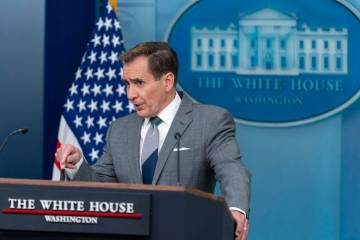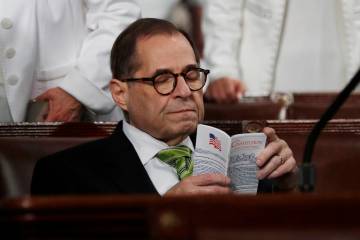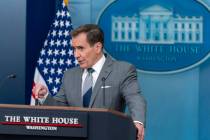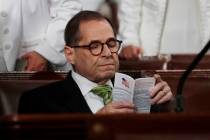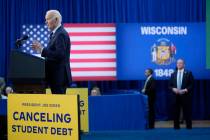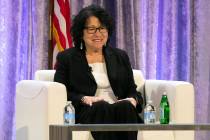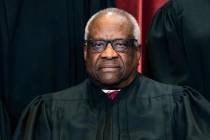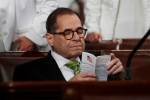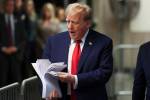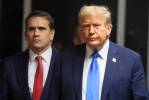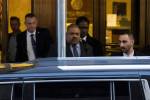After rocky first month, Trump ends first year with strong finish
This is the third installment in a three-part series examining President Donald Trump’s first year in office.
WASHINGTON — President Donald Trump entered the White House determined to change Washington rather than allow Washington to change him.
The road map was simple: insult the Washington establishment, announce hasty policy changes, humiliate the home team, rail against the Russia probe, and never forget to bash the news media. It produced a rocky first month for Trump that led many in Washington to wonder whether his presidency would survive into 2018, and if it did, whether this unorthodox executive could get things done in hostile territory.
But if Trump’s first month in office was notable for its mixture of chaos and dysfunction, the last month of 2017 showed a constant combatant who had reason to believe that his refusal to back down paid off with passage of a sweeping tax overhaul.
Trump was magnanimous during his victory speech in November as he reached out to voters who did not support him and pledged to serve as their president too.
Trump’s inaugural address told America “no more mister nice guy.” The victor declared war on Washington. As elected officials from both parties observed from their places of honor, he assailed D.C. elites who “reaped the reward of government while the people have borne the cost.”
Rather than pay homage to American optimism in the style of Ronald Reagan’s “shining city on a hill,” Trump spoke of “American carnage.”
It was clear that the acceptance speech was the exception, not the rule. Trump had chosen not to ditch the brash style and reality TV formula that won him the most coveted prize in politics.
Rough start
The curtain opened with a lean, loyal staff of longtime retainers and family members competing with a thin bench of Beltway insiders to survive in a high-profile pressure cooker. Trump began with a playbook that promised more drama than necessary to get things done.
On day two, Trump sent out newly minted White House press secretary Sean Spicer to scold the press corps for “deliberately false reporting” on the size of the crowd that came to celebrate Trump’s inauguration.
Fact checkers had a field day refuting Spicer’s inartful claims. PolitiFact rated his remarks “pants on fire” false. The Washington Post fact checker gave Spicer “four Pinocchios.”
Washington’s permanent class was gobsmacked at Trump’s ease in sacrificing a key lieutenant’s credibility for a nonsensical cause.
The spokesman’s reward? The much-lampooned “Spicey,” played by actress Melissa McCarthy, became a staple on “Saturday Night Live.”
In month one, Trump fired national security adviser Michael Flynn for lying to Vice President Mike Pence about post-election phone conversations with Russian Ambassador Sergey Kislyak.
Critics who were convinced that the Trump campaign had colluded with Russian officials felt vindicated. Flynn had spent less time in the key position than a pop-up store at Christmas.
As the FBI and congressional committees investigated Russian meddling in the 2016 election, Trump denounced the story as “fake news” devised to rationalize Hillary Clinton’s surprise loss in November. He would continue to fixate on the unfairness of the probe and Flynn’s fate through most of 2017.
On Feb. 16, Trump gave his first press conference in the East Room. During the 77-minute session, which turned out to be his only solo press conference in the White House to date, Trump berated the “dishonest media” and contended that Flynn “was just doing his job.” Message received. Trump would not make nice with the “fake news” media.
Twitter habit
Trump also made it clear in the first month that he would not break his Twitter habit, which allowed him to publicly obsess about ratings and other measurements as well as take quick swipes at critics without laying out a factual case. In March, for example, Trump tweeted that former President Barack Obama “had (his) ‘wires tapped’ in Trump Tower.” It was the sort of out-of-left-field claim that often prompts Trump loyalists to serve as translators whose job is to explain what Trump really meant.
Americans became inured to watching Trump go after Democrats and the press on Twitter, but his assault on fellow Republicans when he was pushing to pass key legislation proved gratuitously self-destructive.
Perhaps the most dramatic example came in July when Trump invited Republican senators to the White House for lunch. Trump placed Nevada Sen. Dean Heller, who had announced his opposition to an early version of an Obamacare makeover, conspicuously beside him.
“This is the one we were worried about,” Trump mugged as he pointed to Heller with his thumb and predicted Heller’s support on the next vote. “Look, he wants to remain a senator, doesn’t he?”
Heller did support the later, so-called “skinny” version of the bill, but it still failed.
When the president needed the votes of 50 of the Senate’s 52 Republicans, he constantly belittled Arizona’s GOP Sens. John McCain and Jeff Flake, as well as onetime Trump booster Sen. Bob Corker, R-Tenn. While Flake and Corker voted for the skinny bill, McCain did not. Trump’s tone also made it politically palatable for Sens. Susan Collins of Maine and Lisa Murkowski of Alaska to oppose it. And his frequent swipes at Senate Majority Leader Mitch McConnell didn’t help.
Mark Harkins, senior fellow at Georgetown University’s Government Affairs Institute, believes Trump’s petulance may have cost him his goal of dismantling Obamacare. Harkins also noted that Trump’s own former chief strategist, Steve Bannon, may have helped the GOP lose Alabama’s Senate seat when he endorsed Judge Roy Moore, who lost to Democrat Doug Jones.
Trump also belittled and undermined his own staff on Twitter. After Secretary of State Rex Tillerson reached out to Pyongyang for talks, Trump tweeted, “I told Rex Tillerson, our wonderful Secretary of State, that he is wasting his time trying to negotiate with Little Rocket Man.”
Trump repeatedly complains that Attorney General Jeff Sessions was wrong to recuse himself in the Russia probe.
It has become customary for reporters to ask the White House press secretary if Trump retains confidence in a given target. Such questions have been followed by high-profile exits, from chief of staff Reince Priebus, Spicer, and Spicer’s flashy replacement, Anthony Scaramucci — who lasted less than a week — Bannon and Health and Human Services Secretary Tom Price.
Consequential firing
Trump’s most consequential firing occurred in May, when he canned FBI Director James Comey. It was a decision that would haunt Trump for the rest of the year, in part because Trump gave conflicting explanations for the move. At first, Trump said he fired Comey at the urging of top Justice officials concerned over the FBI chief’s handling of a probe into Hillary Clinton’s private server.
Later, Trump told NBC’s Lester Holt he had fired Comey because “Russia is a made-up story.” The New York Times reported that Trump gave a similar explanation to Russian officials.
Comey had his revenge when he arranged for the leak of memos he had written about Trump asking for his loyalty and suggesting that Comey drop his investigation of Flynn. In June, Comey testified that he thought the leaks “might prompt the appointment of a special counsel.”
Mission accomplished. After the Comey leaks, Deputy Attorney General Rod Rosenstein appointed former FBI Director Robert Mueller as special counsel with the ability to consider whether Comey’s termination constituted obstruction of justice.
In October, the special counsel indicted former Trump campaign chairman Paul Manafort and his longtime associate Rick Gates on charges that included money laundering, income tax evasion and lying to federal investigators. None of the counts involved the 2016 election. Former campaign volunteer George Papadopoulos pleaded guilty to lying to federal agents investigating links between the Trump campaign and Russian officials.
On Dec. 1, Flynn pleaded guilty to lying to the FBI about his talks with Kislyak. The White House continues to maintain that while Flynn has admitted to lying, investigators have shown no proof that Trump campaign officials colluded with Russia.
Unforced error
Trump’s other major unforced error occurred in August after a white supremacist who was protesting the removal of a Confederate statue in Charlottesville, Virginia, mowed his car into a crowd and killed counterprotester Heather Heyer.
Rather than denounce the homicidal driver, Trump delivered a statement that condemned “this egregious display of hatred, bigotry and violent on many sides.” It was a moral equivalency argument that angered the left and right.
Two days later, Trump refined his message by targeting white supremacists for disapproval. But the next day, Trump stepped in it again when he reverted to his initial reaction that “there’s blame on both sides.”
The unnecessary controversy led American CEOs to resign from Trump advisory panels en masse. In short order, so many corporate suits had fled that Trump dissolved the panels.
Where other politicians might have caved in, Trump did not allow the many reversals to prompt him to back down.
By year’s end and with passage of the Tax Cuts and Jobs Act, Trump would find corporate America backing him up. AT&T and Comcast announced they would reward workers with bonuses, while Wells Fargo raised its hourly minimum wage to $15.
For Heller, all’s well that ends well.
“Oh, it was fine,” Heller said recently about the lunch where Trump presented him as a political hostage. “And I said this then, that it was just Trump being Trump.”
Heller has seen Trump appeal to the GOP conference with both carrot and stick.
“And frankly, you can tell after yesterday, he’s pretty successful,” Heller told the Las Vegas Review-Journal after the Senate passed the tax cut bill.
Washington has come to understand that you don’t get Trump policies without Trump theatrics.
Contact Debra J. Saunders at dsaunders@reviewjournal.com or 202-662-7391. Follow @DebraJSaunders on Twitter.
Related
In first year, Trump reshaping government to reflect his vision (Part 2 in series)
In his first year, Trump changes the rules for diplomacy and trade (Part 1 in series)
Team Trump turnover
These top Trump team members were fired or quit in 2017:
— Mike Flynn, national security adviser
— Michael Dubke, communications director
— Reince Priebus, chief of staff
— Sean Spicer, press secretary and communications director
— Anthony Scaramucci, replacement communications director
— Steve Bannon, chief strategist
— Tom Price, Health and Human Services secretary
— Omarosa Manigault-Newman, Office of Public Liaison communications director








